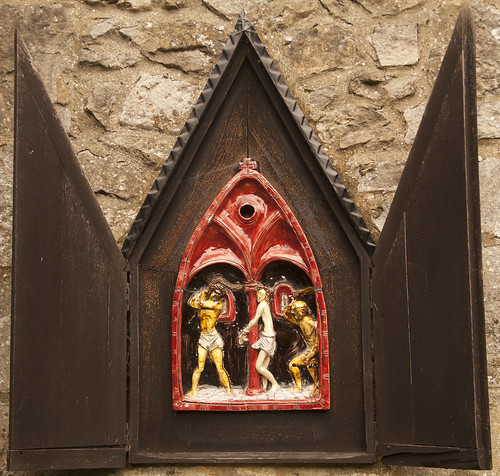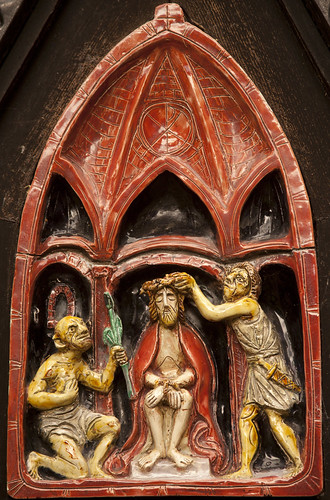
Part 1 of this series.
Part 2 of this series.
Part 3 of this series.
This isn't a bad moment to reflect on something which is often said: while liberals support each other in their efforts, conservatives often don't, and lose out that way. Peter Kwasniewski mentioned it today, in an aside. Speaking of Bugnini and his colleagues, he writes:
They were men who seized their opportunities and did not sit on their hands wondering when other people would do the job for them, or worse, waste their time on endless bickering and hairsplitting. Like our political liberals, they could lay aside small differences for the sake of gaining major objectives.
My question is: why is it so often the case that liberals and leftists are able to present a united front and their conservative opponents cannot? And can it be remedied?
First, I agree that this is a real phenomenon. In secular politics it is very striking. Back in the days of the British 'looney left' of the early 1980s there was an amazing display of this which allowed extreme leftists to take over trade unions and to some extent the British Labour Party. They agreed among themselves on what they called a 'Broad Left' candidate in elections and backed this person against the divided moderate opposition. More recently a radical agenda of same-sex marriage, the normalisation of homosexuality and so on has been backed by a coalition of homosexual activists, feminists, and left-wing politicians left without an ideology by the fall of Communism. In the Church we find conservative efforts of all kinds frustrated by a coalition of liturgical mavericks and every imaginable kind of theological dissident.
The explanation, however, is certainly not that the the allies either agree ideologically or have warm feelings of comradeship towards each other. The Trotskyites and the Communist Party types of the 1980s loathed each other. Feminists and gays don't, ahem, always get on. I don't suppose the 57 varieties of theological liberal in the Catholic Church today are engaged in a great big group hug. These alliances work despite a lack of fellow feeling, because it suits the interests of the allies. Once they gain power, then they can turn on each other, as the Bolsheviks did in the Soviet Union, the Communists and the Anarchists did in Barcelona in the Spanish Civil War, and so on.
People can join in an effective alliance insofar as they have common aims. Until they achieve complete power, these coalitions could set aside their differences because they have a very simple immediate aim, the destruction of what they see as oppressive power structures: capitalism, the family, or the structure of doctrine and liturgy.
 |
| Christ was opposed by an amazing coalition: Pharisees, Sadducees, Herodians, and the Roman governor. |
Their ignorance about the shape of the future they want to bring about is ideologically defensible, in fact, because they believe that humans will truly flourish when the oppressive power-structures are destroyed. The new society will be built by these flourishing people of the future, we can leave the complicated practical decisions to them.
Tomorrow I'll show how their conservative opponents are in a completely different situation.
Support the work of the LMS by becoming an 'Anniversary Supporter'.
I think traditional Catholics in general are united on fundamental matters of doctrine. There's many disagreements wherewithin (such as if the liturgical edits of Pius XII should be imposed, kept as an option, or undone), but they are comparatively minor when you realize that all traditional Catholics are in agreement that the Extraordinary Form at the very least should be universally permissible, that Holy Communion should not be given to unrepentant mortal sinners, that the heterodox should not be permitted to be clergy or teachers, etc.
ReplyDeleteThe reason we're getting nowhere is because the hierarchy has been overflowing with anti-traditionalists for decades. It's almost an entirely bottom-to-top struggle when prelates like Kasper, and Bagnasco keep appointing their like-minded, while those like Schneider and Burke remain a tiny minority.
I have come to the conclusion, having observed life over a number of years that battles are not so much won by one side, as lost by the other.
ReplyDeleteCatholicism, that is orthodox Catholicism, has lost battles repeatedly over the last half century.
Complacency, excess respect for “authority”, false meekness, reliance on trust when the sword might have been more appropriate. Take your pick. But we have lost battle after battle.
Things have to change if Catholicism is to survive.
Christ offered us Love but did not impose it. We have to choose. He repeatedly made it clear that those who were not for Him were against Him. He came not to offer Peace but a Sword. He came if necessary, to set man against father, daughter against mother. If we do not take up the Cross, if we opt to be nice and accommodating, and take the easy way out, we are not worthy.
Orthodox Catholics over the last fifty years in particular have forgotten that.
There is yet another crisis ahead in the journey of the Church now, and it will require all good Catholics and True to take up the Sword against the liberal, secularised, relativised, modernised faction in the Church which
may now be, if the Synod is anything to go by, the majority.
Sorry Mr Chairman, I shall look forward to tomorrow’s note, I promise.
So-called "liberals" - those who reject fundamentals of the Faith and moral law - are more united because they are getting their evil way throughout the Church, and have achieved much of what they want. They are in the ascendant. As for those who keep the Faith and the moral law, they have had to witness the destruction of faith and morals, from the top down, increasing exponentially. The remnant are persecuted, whilst many others have failed to persist in upholding the Faith in totality, thinking that they can avoid persecution; they have been scandalously silent, acquiescing by their refusal to resist, in the downward spiral. However, as the apostasy has grown and intensified, there is less room for faithful clergy or lay to continue to refuse to fight against the onslaught of evil, and they must either side with the Deposit of Faith and the Natural Law or admit that they have gone over to the world (as in fact many of them have). They can no longer pretend to be upholding the unchanging Faith and morals whilst refusing to oppose the explicit and horrendous attacks on God, His Holy Faith and the faithful (clergy, religious and lay).
ReplyDeleteI don't know if it is actually true to say that conservatives are divided. That seems like a false assumption.
ReplyDeleteMaybe it is more accurate to say that there are many who consider themselves as "faithful Catholics" or "Conservatives" when they actually subscribe to liberal ideas. I think the responsibility for that is the Church hierarchy as many have pointed out already. They have given the impression that tradition is not necessary to be a faithful Catholic or a Conservative.
Most have lead by giving such an example as well. If you think about it, almost all the Popes since Vatican II are not traditional. They may have sympathy for tradition but they don't really think of it as necessary.
Heretics have more weapons in their armoury and are prepared to use them. In particular they are quite happy to use the principles of Gradualism in order to move the debate in the direction they desire. They will do this even at the expense of achieving their ultimate objectives in the timescale they desire.
ReplyDeleteAs conservatives are more wedded to the notion of truth, they reject strategies such as Gradualism in order to achieve their ends as it would be fundamentally dishonest. Hence the phenomenon of being bogged down in hair-splitting among their forces.
Only a steadfast adherence to Tradition and the law of non-contradiction can hope to defeat the forces of modernism. However, that must include the principle enunciated by Our Lord that the wise scholar takes form his treasury both what is old and what is new. There is nothing wrong with the legitimate development of doctrine which does not contradict what has always and everywhere been believed.